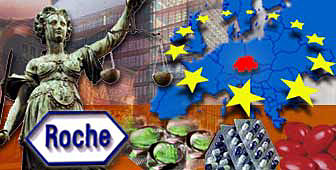EU slaps new fine on Roche for price fixing

The Swiss healthcare group Roche has been fined €64 million (SFr94 million) by the European Commission for its role in a price-fixing cartel.
The Commission said Roche participated in a “price-fixing and market-sharing cartel in citric acid”, an additive used in soft drinks and food.
The Basel-based food company Jungbunzlauer (JBL) was also fined €18 million (SFr26 million) by the Commission for its role in the citric acid cartel. JBL is one of the world’s leading manufacturers of citric acid.
“As with the vitamins case, the behaviour of Roche and others shows a disregard for their customers and, ultimately, the customers who paid more for the products concerned,” said Competition Commissioner Mario Monti.
“The fact that some of these companies have only recently been sanctioned for similar conduct illustrates how widespread these secret practices are, or at least used to be.”
Wednesday’s announcement comes a fortnight after the Commission slapped a €462 million (SFr673 million) fine on the Basel-based group for its involvement in a vitamin price-fixing cartel.
Anti-trust regulations
Horst Kramer, Roche spokesman, admitted to swissinfo that the company breached EU anti-trust regulations.
“Roche admits that there was a cartel. We never did deny this,” he said. “As soon as the fact became known to our executive management they immediately collaborated very closely with the authorities.
Because of the collaboration with the Commission Roche is expected to pay 20 per cent less on their fine.
“We do not question the principal fact that there were anti-trust violations,” he said.
However, Kramer said that “The activities themselves were immediately stopped and adequate actions were taken to avoid this ever happening again in this company.”
Past practices
Stephan Garelli, a competitiveness expert at the Institute for Management Development in Lausanne, said he believed Roche was paying the price for past business practices.
Garelli told swissinfo that in the past, anti-trust law had not been as powerful in Switzerland as elsewhere, while the situation regarding cartels in Switzerland had historically been “quite ambiguous”.
“It has led for many years to a situation where a large number of companies in Switzerland had, as a common practice, a number of agreements on price, on distribution channels, etc,” said Garelli.
“It was not illegal; it was part of the game. Then the law changed and I think what we are seeing now is the inheritance of past practices. We have to update our business practices to the new European environment and indeed the American one.”
by Adam Beaumont and Scott Capper

In compliance with the JTI standards
More: SWI swissinfo.ch certified by the Journalism Trust Initiative
You can find an overview of ongoing debates with our journalists here. Please join us!
If you want to start a conversation about a topic raised in this article or want to report factual errors, email us at english@swissinfo.ch.